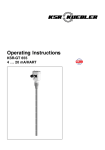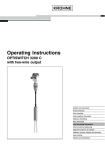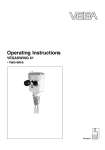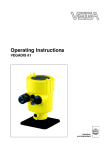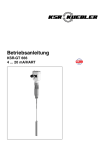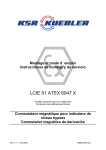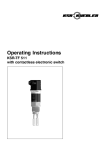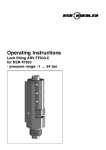Download Operating Instructions
Transcript
Operating Instructions KSR-GT 666 4 … 20 mA/HART WE'VE GOT O ABILITY Contents Contents 1 About this document 1.1 1.2 1.3 2 . . . . . . . . . . . . . . . . . . . . . . . . . . . . . . . . . . . . . . . . . . .. .. .. .. .. .. 5 5 5 5 5 6 Configuration. . . . . . . Principle of operation . Adjustment . . . . . . . . Storage and transport . . . . . . . . . . . . . . . . . . . . . . . . . . . . . . . . . . . . . . . . . . . . . . . . . . . . . . . . . . . . . . . . . . . . .. .. .. .. 7 7 8 8 General instructions. . . . . . . . . . . . . . . . . . . . . 9 Mounting information . . . . . . . . . . . . . . . . . . . . 10 Preparing the connection . . . . . . . . . . . . . . Connection procedure . . . . . . . . . . . . . . . . Wiring plans, single chamber housing . . . . . Wiring plans, double chamber housing . . . . Wiring plans, double chamber housing Exd . . . . . . .. .. .. .. .. 13 14 15 16 19 Short description . . . . . . . . . . . . . . . . . . . . Insert the indicating and adjustment module Adjustment system . . . . . . . . . . . . . . . . . . Setup procedure . . . . . . . . . . . . . . . . . . . . Menu schematic . . . . . . . . . . . . . . . . . . . . . . . . . .. .. .. .. .. 21 21 23 24 27 Maintenance and fault rectification Maintenance . . . . . . . . . . . . . . . . . . . . . . . . . . 30 Fault rectification . . . . . . . . . . . . . . . . . . . . . . . 30 Instrument repair . . . . . . . . . . . . . . . . . . . . . . . 31 KSR-GT 666 - 4 … 20 mA/HART 30571-EN-050728 7.1 7.2 7.3 2 . . . . . . Setup with the indicating/adjustment module 6.1 6.2 6.3 6.4 6.5 7 . . . . . . Connecting to power supply 5.1 5.2 5.3 5.4 5.5 6 . . . . . . Mounting 4.1 4.2 5 Authorised personnel . . . . . . . . Appropriate use. . . . . . . . . . . . Warning about misuse . . . . . . . General safety instructions . . . . CE conformity . . . . . . . . . . . . . Safety information for Ex areas. Product description 3.1 3.2 3.3 3.4 4 4 4 4 For your safety 2.1 2.2 2.3 2.4 2.5 2.6 3 Function . . . . . . . . . . . . . . . . . . . . . . . . . . . . . Target group . . . . . . . . . . . . . . . . . . . . . . . . . . Symbolism used . . . . . . . . . . . . . . . . . . . . . . . Contents 8 Dismounting 8.1 8.2 9 Dismounting procedure . . . . . . . . . . . . . . . . . . 32 Disposal . . . . . . . . . . . . . . . . . . . . . . . . . . . . . 32 Supplement Technical data. . . . . . . . . . . . . . . . . . . . . . . . . 33 Dimensions . . . . . . . . . . . . . . . . . . . . . . . . . . . 45 Certificates . . . . . . . . . . . . . . . . . . . . . . . . . . . 50 30571-EN-050728 9.1 9.2 9.3 KSR-GT 666 - 4 … 20 mA/HART 3 About this document 1 About this document 1.1 Function This operating instructions manual has all the information you need for quick setup and safe operation of KSR-GT 666. Please read this manual before you start setup. 1.2 Target group This operating instructions manual is directed to trained personnel. The contents of this manual should be made available to these personnel and put into practice by them. 1.3 Symbolism used Information, tip, note This symbol indicates helpful additional information. Caution, warning, danger This symbol informs you of a dangerous situation that could occur. Ignoring this cautionary note can impair the person and/ or the instrument. Ex applications This symbol indicates special instructions for Ex applications. l List The dot set in front indicates a list with no implied sequence. à Action This arrow indicates a single action. 1 Sequence Numbers set in front indicate successive steps in a procedure. 30571-EN-050728 4 KSR-GT 666 - 4 … 20 mA/HART For your safety 2 For your safety 2.1 Authorised personnel All operations described in this operating instructions manual must be carried out only by trained, specialised personnel authorised by the operator. For safety and warranty reasons, any internal work on the instruments must be carried out only by personnel authorised by the manufacturer. 2.2 Appropriate use KSR-GT 666 is a sensor for continuous level measurement in liquids. 2.3 Warning about misuse Inappropriate or incorrect use of the instrument can give rise to application-specific hazards, e.g. vessel overfill or damage to system components through incorrect mounting or adjustment. 2.4 General safety instructions KSR-GT 666 is a high-tech instrument requiring the strict observance of standard regulations and guidelines. The user must take note of the safety instructions in this operating instructions manual, the country-specific installation standards (e.g. the VDE regulations in Germany) as well as all prevailing safety regulations and accident prevention rules. 2.5 CE conformity KSR-GT 666 is in CE conformity with EMC (89/336/EWG), fulfils the NAMUR recommendation NE 21 and is in CE conformity with NSR (73/23/EWG). Conformity has been judged acc. to the following standards: EMC: - Emission EN 61326: 2004 (class B) - Susceptibility EN 61326: 2004 incl. supplement A l NSR: EN 61010-1: 2001 30571-EN-050728 l KSR-GT 666 - 4 … 20 mA/HART 5 For your safety 2.6 Safety information for Ex areas Please note the Ex-specific safety information for installation and operation in Ex areas. These safety instructions are part of the operating instructions manual and come with the Exapproved instruments. 30571-EN-050728 6 KSR-GT 666 - 4 … 20 mA/HART Product description 3 Product description 3.1 Configuration Scope of delivery The scope of delivery encompasses: l l Components KSR-GT 666 level sensor Documentation - this operating instructions manual - Ex-specific safety instructions (with Ex versions) and, if necessary, further certificates KSR-GT 666 consists of: l l l Process fitting with probe Housing with electronics Housing cover, optionally available with indicating/adjustment module 1 2 3 30571-EN-050728 Fig. 1 2 3 1: KSR-GT 666 in cable version with plastic housing Housing cover, optionally available with indicating/adjustment module Housing with electronics Process fitting 3.2 Principle of operation Area of application KSR-GT 666 - 4 … 20 mA/HART KSR-GT 666 is a level sensor with coax, rod or cable probe for continuous level measurement in products with temperatures between -200°C and +400°C (-328 … +752°F). 7 Product description It is designed for industrial use in all areas of process technology and is used in liquids. Physical principle High frequency microwave pulses are guided along a steel rope or a rod. When reaching the product surface, the microwave pulses are reflected. The running time is evaluated by the instrument and outputted as distance. Power supply Two-wire electronics 4 … 20 mA/HART for power supply and measured value transmission on the same cable. The power supply range can differ depending on the instrument version. The exact range is stated in the "Technical data" in the "Supplement". 3.3 Adjustment KSR-GT 666 can be adjusted with three different adjustment media: l l with indicating/adjustment module a HART handheld The entered parameters are generally saved in KSR-GT 666, optionally also in the indicating/adjustment module. 3.4 Storage and transport Packaging Your instrument was protected by packaging during transport. Its capacity to handle normal loads during transport is assured by a test acc. to DIN EN 24180. The packaging of standard instruments consists of environment-friendly, recyclable cardboard. For special versions, PE foam or PE foil is also used. Dispose of the packaging material via specialised recycling companies. Storage and transport temperature l l Storage and transport temperature see "Supplement – Technical data – Ambient conditions" Relative humidity 20 … 85 % 30571-EN-050728 8 KSR-GT 666 - 4 … 20 mA/HART Mounting 4 Mounting 4.1 General instructions Installation position Select an installation position you can easily reach for mounting and connecting as well as later retrofitting of an indicating and adjustment module. The housing can be rotated by 330° without the use of any tools. You can also install the indicating and adjustment module in four different positions (each displaced by 90°). Handling With screwed versions, the housing must not be used for screwing in! Tightening can cause damages on the locking piston of the housing. To screw in, use the hexagon above the thread. Moisture Use the recommended cable (see chapter "Connecting to power supply") and tighten the cable entry. You can give your KSR-GT 666 additional protection against moisture penetration by leading the connection cable downward in front of the cable entry. Rain and condensation water can thus drain off. This applies mainly to mounting outdoors, in areas where moisture is expected (e.g. by cleaning processes) or on cooled or heated vessels. Fig. 2: Measures against moisture penetration 30571-EN-050728 Measuring range The reference plane for the measuring range of the sensors is the seal surface of the thread or flange. Keep in mind that a min. distance (dead band) must be maintained below the reference plane and possibly at the end of the probe - measurement in these areas is not possible. Also note that the cable length cannot be utilised all the way to KSR-GT 666 - 4 … 20 mA/HART 9 Mounting the end of the probe, as measurement in the area of the gravity weight is not possible. These min. distances (dead band) are stated in the Technical data in the Supplement. Pressure The process fitting must be sealed if there is gauge or low pressure in the vessel. Before use, check if the seal material is resistant against the measured product. The max. permissible pressure is stated in the "Technical data" in the "Supplement" or on the type label of the sensor. 4.2 Mounting information Installation position Mount KSR-GT 666 in such a way that the probe does not touch any installations or the vessel wall during installation. Mount cable and rod versions of KSR-GT 666 in such a way that the distance to vessel installations or vessel wall is at least 300 mm (12 in). During operation, the probe must not touch any installations or the vessel wall. If necessary, fasten the probe end. In vessels with conical bottom it can be advantageous to mount the sensor in the center of the vessel, as measurement is then possible down to the lowest point of the vessel bottom. When using the cable version, make sure that a measurement up to the probe tip is not possible. The exact value of the min. distance (lower dead band) is stated in the Technical data in the Supplement. 30571-EN-050728 Fig. 3: Vessel with conical bottom 10 KSR-GT 666 - 4 … 20 mA/HART Mounting Inflowing material Make sure that the probe is not subjected to strong lateral forces. Mount KSR-GT 666 at a location in the vessel where no disturbing influence from e.g. filling openings, agitators, etc. can occur. Fig. 4: Lateral load Fasten If the probe can touch the vessel wall during operation due to product movements or agitators etc., the probe should be strained. There is a thread (M12) in the gravity weight, e.g. for a lug. Make sure that the probe cable is not completely taut. Avoid tensile loads on the rope. Avoid undetermined cable-vessel-connection, i.e. the connection must be either grounded reliably or isolated reliably. Any change of this requirement will cause measurement errors. 30571-EN-050728 Heat insulation KSR-GT 666 should be integrated in the vessel installation. This prevents the electronics from strong heating by heat radiation. The vessel insulation must not exceed a certain height on the sensor. KSR-GT 666 - 4 … 20 mA/HART 11 Mounting 2 1 3 Fig. 1 2 3 5: Vessel with heat insulation Heat insulation Max. height of the vessel insulation Vessel insulation - Dimensions are stated in the Supplement under "Dimensions" 30571-EN-050728 12 KSR-GT 666 - 4 … 20 mA/HART Connecting to power supply 5 Connecting to power supply 5.1 Preparing the connection Note safety instructions Always observe the following safety instructions: l l Connect only in the complete absence of line voltage If overvoltages are expected, overvoltage arresters should be installed. Take note of safety instructions for Ex applications In hazardous areas you should take note of the appropriate regulations, conformity and type approval certificates of the sensors and power supply units. Select power supply Power supply and current signal are transmitted via the same two-wire connection cable. The power supply range can differ depending on the instrument version. The exact range is stated in the "Technical data" in the Supplement. Provide a reliable separation between the supply circuit and the mains circuits acc. to DIN VDE 0106 part 101. Bear in mind the following factors regarding supply voltage: l l the reduction of the output voltage of the power supply unit under nominal load (with a sensor current of 20.5 mA or 22 mA in case of fault signal) the influence of additional instruments in the circuit (see load values in Technical data). Select connection cable KSR-GT 666 is connected with standard, unscreened two-wire cable. An outer cable diameter of 5 ... 9 mm ensures the seal effect of the cable entry. If electromagnetic interference is expected, we recommend the use of screened cable. Cable screening and grounding Connect the cable screen on both ends to ground potential. In the sensor, the screen must be connected directly to the internal ground terminal. The ground terminal outside on the housing must be connected to the potential equalisation (low impedance). 30571-EN-050728 If potential equalisation currents are expected, the connection on the evaluation side must be made via a ceramic capacitor (e.g. 1 nF, 1500 V). The low frequency potential equalisation currents are thus suppressed, but the protective effect against high frequency interference signals remains. KSR-GT 666 - 4 … 20 mA/HART 13 Connecting to power supply Select connection cable for Ex applications Take note of the corresponding installation regulations for Ex applications. In particular, make sure that no potential equalisation currents flow over the cable screen. In case of grounding on both sides this can be achieved by the use of a capacitor or a separate potential equalisation. 5.2 Connection procedure Proceed as follows: 1 Unscrew the housing cover 2 If an indicating and adjustment module is installed, remove it by turning it slightly to the left. 3 Loosen compression nut of the cable entry 4 Remove approx. 10 cm (4 in) of the cable mantle, strip approx. 1 cm (0.4 in) insulation from the ends of the individual wires 5 Insert the cable into the sensor through the cable entry 6 Lift the opening levers of the terminals with a screwdriver (see following illustration) 7 Insert the wire ends into the open terminals according to the wiring plan 30571-EN-050728 Fig. 6: Connection steps 6 and 7 14 KSR-GT 666 - 4 … 20 mA/HART Connecting to power supply 8 Press down the opening levers of the terminals, you will hear the terminal spring closing 9 Check the hold of the wires in the terminals by lightly pulling on them 10 Connect the screen to the internal ground terminal and the external ground terminal to potential equalisation 11 Tighten the compression nut of the cable entry, the seal ring must completely encircle the cable 12 Screw the housing cover back on The electrical connection is finished. 5.3 Wiring plans, single chamber housing The following illustrations apply to the non-Ex as well as to the Ex ia version. Housing overview 4 4 1 2 3 7: Material versions, single chamber housing Plastic Aluminium Stainless steel Filter element for pressure compensation 30571-EN-050728 Fig. 1 2 3 4 4 KSR-GT 666 - 4 … 20 mA/HART 15 Connecting to power supply Electronics and connection compartment Display I2C 1 1 2 5 6 7 8 2 Fig. 8: Electronics and connection compartment, single chamber housing 1 Spring-loaded terminals for power supply 2 Ground terminal for connection of the cable screen Wiring plan Display I2C 1 2 5 6 7 8 1 Fig. 9: Wiring plan, single chamber housing 1 Power supply/Signal output 5.4 Wiring plans, double chamber housing The following illustrations apply to the non-Ex as well as to the Ex ia version. The Exd version is described in the next subchapter. 30571-EN-050728 16 KSR-GT 666 - 4 … 20 mA/HART Connecting to power supply Housing overview 1 2 3 5 4 Fig. 1 2 3 4 5 10: Double chamber housing Housing cover, connection compartment Blind stopper Housing cover, electronics compartment Filter element for pressure compensation Cable entry or plug Electronics compartment 1 Display I2C 1 2 5 6 7 8 30571-EN-050728 Fig. 11: Electronics compartment, double chamber housing 1 Internal connection cable to the connection compartment KSR-GT 666 - 4 … 20 mA/HART 17 Connecting to power supply Display Connection compartment 1 1 2 I2C 2 Fig. 12: Connection compartment, double chamber housing 1 Spring-loaded terminals for power supply 2 Ground terminal for connection of the cable screen Wiring plan I2C 1 2 1 Fig. 13: Wiring plan, double chamber housing 1 Power supply/Signal output 30571-EN-050728 18 KSR-GT 666 - 4 … 20 mA/HART Connecting to power supply 5.5 Wiring plans, double chamber housing Exd Housing overview 1 2 3 5 4 Fig. 1 2 3 4 5 14: Double chamber housing Housing cover, connection compartment Blind stopper Housing cover, electronics compartment Filter element for pressure compensation Cable entry or plug Electronics compartment 1 Display I2C 1 2 5 6 7 8 30571-EN-050728 Fig. 15: Electronics compartment, double chamber housing 1 Internal connection cable to the connection compartment KSR-GT 666 - 4 … 20 mA/HART 19 Connecting to power supply Connection compartment 1 1 2 2 Fig. 16: Connection compartment, double chamber housing Exd 1 Spring-loaded terminals for power supply and cable screen 2 Ground terminal for connection of the cable screen Wiring plan 1 2 1 Fig. 17: Wiring plan, double chamber housing Exd 1 Power supply/Signal output 30571-EN-050728 20 KSR-GT 666 - 4 … 20 mA/HART Setup with the indicating/adjustment module 6 Setup with the indicating/adjustment module 6.1 Short description Function/Configuration The indicating/adjustment module is used for measured value display, adjustment and diagnosis. It can be mounted in all sensors of the GT 6 instrument family, in the single as well as double chamber housing (optionally in the electronics or connection compartment). 6.2 Insert the indicating and adjustment module The indicating/adjustment module can be inserted or removed at any time. It is not necessary to interrupt the power supply. To mount, proceed as follows: 1 Unscrew the housing cover 2 Place the indicating/adjustment module in the desired position on the electronics (you can choose any one of four different positions - each displaced by 90°) 3 Press the indicating and adjustment module onto the electronics and turn it to the right until it snaps in. 4 Screw housing cover with inspection window tightly back on Removal is carried out in reverse order. 30571-EN-050728 The indicating/adjustment module is powered by the sensor, an additional connection is not necessary. KSR-GT 666 - 4 … 20 mA/HART 21 Setup with the indicating/adjustment module Fig. 18: Installing the indicating/adjustment module Note: If you intend to retrofit KSR-GT 666 with an indicating/ adjustment module for continuous measured value indication, a higher cover with an inspection glass is required. 30571-EN-050728 22 KSR-GT 666 - 4 … 20 mA/HART Setup with the indicating/adjustment module 6.3 Adjustment system 2 1 1.1 3 Key functions 30571-EN-050728 Adjustment system KSR-GT 666 - 4 … 20 mA/HART Fig. 1 2 3 19: Indicating and adjustment elements LC display Indication of the menu item number Adjustment keys l [OK] key: - move to the menu overview - confirm selected menu - edit parameter - save value l [–>] key to select: - menu change - list entry - editing position l [+] key: - modify value of a parameter l [ESC] key: - interrupt input - jump to the next higher menu The sensor is adjusted via the four keys of the indicating and adjustment module. The LC display indicates the individual menu items. The functions of the individual keys are shown in the above illustration. Approx. 10 minutes after the last pressing of a key, an automatic reset to measured value indication is triggered. Any values not confirmed with [OK] will not be saved. 23 Setup with the indicating/adjustment module 6.4 Setup procedure Switch on phase After KSR-GT 666 is connected to power supply, the instrument carries out a self-test for approx. 30 seconds. The following steps are carried out: l l l Internal check of the electronics Indication of the instrument type, the firmware version as well as the sensor TAGs (sensor name) Output signal jumps briefly (approx. 10 seconds) to the set fault current Then the actual measured value is displayed and the corresponding current is transmitted to the cable.1) Address setting HART-Multidrop In HART-Multidrop mode (several sensors on one input) the address must be set before continuing with the parameter adjustment. You will find a detailed description in the operating instructions manual of the indicating/adjustment module. HART mode Standard Address 0 Parameter adjustment Because KSR-GT 666 is a distance measuring instrument, the distance from the sensor to the product surface is measured. In order to have the actual product level displayed, an allocation of the measured distance to the height percentage must be carried out. To make this adjustment, the full and empty distances in the vessel are entered. If these values are known, it is also possible to carry out the adjustment with other distances, e.g. 10 % and 90 %. Starting point of these distance values is always the seal surface of the thread or flange. The actual level is then calculated on the basis of these entered values. At the same time, the operating range of the sensor is limited from maximum range to the requested range. The real product level during this adjustment is not important, because the min./max. adjustment is always carried out without changing the product level. These settings can be made ahead of time without the instrument having to be installed. 1) 24 The values correspond to the actual level as well as to the settings already carried out, e.g. default setting. KSR-GT 666 - 4 … 20 mA/HART 30571-EN-050728 In the main menu item "Basic adjustment", the individual submenu items should be selected one after the other and provided with the correct parameter values. Setup with the indicating/adjustment module Start your parameter adjustment with the following menu items of the basic adjustment: Carrying out min. adjustment Proceed as follows: 1 ▶ 2 Move from the measured value display to the main menu by pushing [OK]. Basic adjustment Display Diagnostics Service Info Select the menu item "Basic adjustment" with [–>] and confirm with [OK]. Now the menu item "Min. adjustment" is displayed. Min. adjustment 0.00 % = 10.000 m(d) 8.000 m(d) Carry out max. adjustment 3 Prepare the % value for editing with [OK] and set the cursor to the requested position with [–>]. Set the requested percentage value with [+] and save with [OK]. The cursor jumps now to the distance value. 4 Enter the appropriate distance value in m (corresponding to the percentage value) for the empty vessel (e.g. distance from the sensor to the vessel bottom). 5 Save the settings with [OK] and move to "Max. adjustment" with [–>]. Proceed as follows: 30571-EN-050728 Max. adjustment 100.00 % = 1.000 m(d) 2.000 m(d) KSR-GT 666 - 4 … 20 mA/HART 1 Prepare the % value for editing with [OK] and set the cursor to the requested position with [–>]. Set the requested percentage value with [+] and save with [OK]. The cursor jumps now to the distance value. 2 Enter the appropriate distance value in m (corresponding to the percentage value) for the full vessel. Keep in mind that the max. level must lie below the dead band. 25 Setup with the indicating/adjustment module 3 Damping Save the settings with [OK]. To suppress fluctuation in the measured value display, e.g. caused by a turbulent product surface, an integration time can be set. This time can be between 0 and 999 seconds. Please note that the reaction time of the entire measurement will be longer and the sensor will react to quick changes of the measured value with a corresponding delay. In general, a time of a few seconds is sufficient to smooth the measured value display. Damping 0s Enter the requested parameter via the appropriate keys, save your settings and jump to the next menu item with the [–>] key. Linearization curve A linearization is necessary for all vessels in which the vessel volume does not increase linearly with the level – e.g. in a cylindrical or spherical tank -–and the indication or output of the volume is requested. Corresponding linearization curves are preprogrammed for these vessels. They represent the correlation between the level percentage and vessel volume. By activating the appropriate curve, the volume percentage of the vessel is displayed correctly. If the volume should not be displayed in percent but e.g. in l or kg, a scaling can be also set in the menu item "Display". Linearization curve Linear Enter the requested parameter via the appropriate keys, save your settings and jump to the next menu item with the [–>] key. Sensor-TAG In this menu item you can enter an unambiguous designation for the sensor, e.g. the measurement loop name or the tank or product designation. In digital systems and in the documentation of larger plants, a singular designation should be entered for exact identification of individual measuring sites. 30571-EN-050728 26 KSR-GT 666 - 4 … 20 mA/HART Setup with the indicating/adjustment module Sensor-TAG Sensor With this menu item, the Basic adjustment is finished and you can now jump to the main menu with the [ESC] key. Additional adjustment and diagnosis options such as e.g. scaling, simulation or trend curve presentation are shown in the following menu schematic. You will find a detailed description of these menu items in the operating instructions manual of the indicating and adjustment module. 30571-EN-050728 Optional settings KSR-GT 666 - 4 … 20 mA/HART 27 Setup with the indicating/adjustment module 6.5 Menu schematic Basic adjustment ▶ Basic adjustment Display Diagnostics Service Info 1 Min. adjustment 0.00 % = 10.000 m(d) 8.000 m(d) 1.1 Sensor-TAG 1.5 Max. adjustment 100.00 % = 1.000 m(d) 2.000 m(d) 1.2 Unit 2.2 Damping 1.3 0s Linearization curve 1.4 Linear Sensor Display ▶ Basic adjustment Display Diagnostics Service Info Displayed value scaled 2 2.1 Volume hl Scaling 2.3 0 % = 000.5 hl 100 % = 005.0 hl Diagnostics ▶ Basic adjustment Display Diagnostics Service Info Peak values Distance-min.: 0.234 m(d) Distance-max: 5.385 m(d) 3 3.1 Sensor status OK 3.2 Choose curve Echo curve 3.3 Echo curve 3.4 Presentation of the echo curve 30571-EN-050728 28 KSR-GT 666 - 4 … 20 mA/HART Setup with the indicating/adjustment module Service ▶ Basic adjustment Display Diagnostics Service Info 4 Current output Meas. range: 4-20mA Failure mode: 20.5mA Min. current: 4mA 4.1 Language 4.5 Simulation 4.2 Start simulation? Deutsch Reset 4.3 Units of measurement Reset now? HART mode Standard Address 0 4.6 Date of manufacture 04. March 2005 Software version 4.10.00 5.2 Copy sensor data 4.4 m(d) 4.7 Copy from sensor Copy to sensor PIN 4.8 Enable? Info ▶ Basic adjustment Display Diagnostics Service Info 5.1 Date of last change using PC 5.3 04. March 2005 Sensor details 5.4 Display now? 30571-EN-050728 Sensor type KSR GT 6x Serial number 12345678 5 KSR-GT 666 - 4 … 20 mA/HART 29 Maintenance and fault rectification 7 Maintenance and fault rectification 7.1 Maintenance When used as directed in normal operation, KSR-GT 666 is completely maintenance-free. 7.2 Fault rectification Checking the 4 … 20 mA signal Connect a hand-held multimeter with a suitable measuring range acc. to the wiring plan. ? 4 … 20 mA signal not stable l supply voltage too low or load resistance too high à check and adapt, if necessary ? 4 … 20 mA signal missing l incorrect connection to power supply à Check connection acc. to chapter "Connection proce- dure" and correct, if necessary, acc. to chapter "Wiring plans" l no power supply à check cables for line break, repair, if necessary l supply voltage too low or load resistance too high à check and adapt, if necessary ? Current signal greater than 22 mA or less than 3.6 mA l Electronics module defective à exchange instrument or return it for repair In Ex applications, the regulations for the wiring of intrinsically safe circuits must be observed. ? E013 l no measured value available à sensor in boot phase 30 KSR-GT 666 - 4 … 20 mA/HART 30571-EN-050728 Fault messages via the indicating/adjustment module Maintenance and fault rectification à sensor does not find an echo, e.g. because of faulty installation or incorrect parameter adjustment à Wrong sensor length entered ? E017 l adjustment span too small à Carry out a fresh adjustment and increase the distance between min. and max. adjustment ? E036 l no operable sensor software à carry out a software update or return instrument for repair ? E042/E043 l hardware error, electronics defective à exchange instrument or return it for repair 7.3 Instrument repair If it is necessary to repair KSR-GT 666 please proceed as follows: l l l 30571-EN-050728 l Clean the instrument and pack it damage-proof Attach a description of the fault, the ambient conditions and measured product to the instrument If necessary, attach a safety sheet to the instrument Send the instrument to the respective address of your agency or to the headquarters in Germany. In Germany to the headquarters. KSR-GT 666 - 4 … 20 mA/HART 31 Dismounting 8 Dismounting 8.1 Dismounting procedure Warning: Before dismounting, be aware of dangerous process conditions such as e.g. pressure in the vessel, high temperatures, corrosive or toxic products etc. Take note of chapters "Mounting" and "Connecting to power supply" and carry out the listed steps in reverse order. 8.2 Disposal KSR-GT 666 consists of materials which can be recycled by specialised recycling companies. We have purposely designed the electronic modules to be easily separable. Mark the instrument as scrap and dispose of it according to national government regulations (e.g. in Germany acc. to electronic scrap ordinance). Materials: see "Technical data" If you cannot dispose of the instrument properly, please contact us about disposal methods or return. 30571-EN-050728 32 KSR-GT 666 - 4 … 20 mA/HART Supplement 9 Supplement 9.1 Technical data General data Material 316L corresponds to 1.4404 or 1.4435 Materials, wetted parts - version -20° … +250°C (-4° … +482° F) - Process fitting - coax version 316L, Hastelloy C22 (2.4602) and PEEK GF 30 - Process fitting - rod version 316L, Hastelloy C22 (2.4602) and PEEK GF 30 - Process fitting - cable version 316L and PEEK GF 30 - tube (ø 21.3 mm / ø 0.84 in) 316L, Hastelloy C22 (2.4602) - rod (ø 6 mm / ø 0.25 in) 316L, Hastelloy C22 (2.4602) - cable (ø 4 mm / ø 0.16 in) 1.4401 (316) - Seal Kalrez 6375 Materials, wetted parts - version -200° … +400°C (-328° … +752 F) - Process fitting - coax version 316L, Hastelloy C22 (2.4602) and Aluminiumoxide ceramic 99.7% (Al₂O₃) - Process fitting - rod version 316L, Hastelloy C22 (2.4602) and Aluminiumoxide ceramic 99.7% (Al₂O₃) - Process fitting - cable version 316L, Hastelloy C22 (2.4602) and Aluminiumoxide ceramic 99.7% (Al₂O₃) - tube (ø 43 mm / ø 1.7 in) 316L - rod (ø 16 mm / ø 0.63 in) 316L - cable (ø 6 mm / ø 0.25 in) 1.4401 (316) - Seal graphite Materials, non-wetted parts - Housing plastic PBT (Polyester), Alu-die casting powder-coated, stainless steel 316L - seal between housing and housing cover NBR (stainless steel housing), silicone (Alu/ plastic housing) - Inspection window in housing cover (option) Polycarbonate - Ground terminal 316L 30571-EN-050728 Weights - version -20° … +250°C (-4° … +482° ) - Plastic housing 760 g (27 oz) - Aluminium housing 1170 g (41 oz) - Aluminium double chamber housing 1470 g (52 oz) - Stainless steel housing 1530 g (54 oz) KSR-GT 666 - 4 … 20 mA/HART 33 Supplement - tube (ø 21.3 mm / ø 0.84 in) approx. 1000 g/m (approx. 10.8 oz/ft) - rod (ø 6 mm / ø 0.25 in) approx. 220 g/m (approx. 2.4 oz/ft) - cable (ø 4 mm / ø 0.16 in) approx. 80 g/m (approx. 0.86 oz/ft) - gravity weight (only with cable version) approx. 325 g (11.5 oz) Weights - version -200° … +400°C (-328° … +752°F) - Plastic housing 7200 g (254 oz) - Aluminium housing 7600 g (268 oz) - Aluminium double chamber housing 7900 g (279 oz) - Stainless steel housing 7960 g (281 oz) - tube (ø 43 mm / ø 1.7 in) approx. 1000 g/m (approx. 10.8 oz/ft) - rod (ø 16 mm / ø 0.63 in) approx. 1600 g/m (approx. 17 oz/ft) - cable (ø 6 mm / ø 0.25 in) approx. 170 g/m (approx. 1.8 oz/ft) - gravity weight (only with cable version) approx. 730 g (25.8 oz) Lengths (L) - tube (ø 43 mm / ø 1.7 in) 0.3 … 6 m (1 … 20 ft) - tube (ø 21.3 mm / ø 0.84 in) 0.3 … 6 m (1 … 20 ft) - rod (ø 16 mm / ø 0.63 in) 0.5 … 6 m (1.6 … 20 ft) - rod (ø 6 mm / ø 0.25 in) 0.5 … 4 m (1.6 … 13 ft) - cable (ø 6 mm / ø 0.25 in) 1 … 60 m (3 … 197 ft) - cable (ø 4 mm / ø 0.16 in) 1 … 32 m (3.3 … 105 ft) Lateral load - tube (ø 43 mm / ø 1.7 in) 100 Nm (885 lbf in) - tube (ø 21.3 mm / ø 0.84 in) 60 Nm (530 lbf/in) - rod (ø 16 mm / ø 0.63 in) 30 Nm (265 lbf in) - rod (ø 6 mm / ø 0.25 in) 4 Nm (35 lbf/in) max. tensile load (cable ø 6 mm / ø 0.25 in) max. tensile load (cable ø 4 mm / ø 0.16 in) 10 KN (2248 lbs) 2.5 KN (562 lbf) 30571-EN-050728 34 KSR-GT 666 - 4 … 20 mA/HART Supplement Output variable Output signal Resolution Fault signal Current limitation Load Integration time (63 % of the input variable) Fulfilled NAMUR recommendation 4 … 20 mA/HART 1.6 µA current output unchanged; 20.5 mA; 22 mA; <3.6 mA (adjustable) 22 mA see load diagram in Power supply 0 … 999 s, adjustable NE 43 Input variable Parameter min. dielectric figure - coax version dead band - coax version - top 50 mm (2.0 in) - 0 mm 30571-EN-050728 bottom level of liquids Er >1.4 KSR-GT 666 - 4 … 20 mA/HART 35 Supplement 1 4 2 3 Fig. 1 2 3 4 20: Measuring range of the KSR-GT 666 - coax version Reference plane Probe length Measuring range Upper dead band min. dielectric figure - rod, cable version dead band - rod version - top 150 mm (5.9 in) - 0 mm bottom Er >1.7 dead band - cable version - top 150 mm (5.9 in) - 250 mm (9.9 in) gravity weight + 100 mm bottom 30571-EN-050728 36 KSR-GT 666 - 4 … 20 mA/HART Supplement 1 1 4 2 4 2 3 3 5 Fig. 1 2 3 4 5 21: Measuring ranges of the KSR-GT 666 - rod and cable version Reference plane Probe length Measuring range Upper dead band lower dead band (only with cable version) Accuracy (similar to DIN EN 60770-1) Reference conditions acc. to DIN EN 61298-1 - Temperature 18 … +30°C (64 … +86°F) Relative humidity 45 … 75 % - Atmospheric pressure 860 … 1060 mbar (86 … 106 kPa/ 12.5 … 15.4 psi) 30571-EN-050728 - KSR-GT 666 - 4 … 20 mA/HART 37 Supplement Characteristic curve deviation and measurement characteristics Reference installation conditions - Flange DN 100 - 500 mm (20 in) min. distance to installations Reference reflector temperature drift (current output) Accuracy Metal plate ø 1 m (ø 40 in) not with coax version 0.06 %/10 K relating to the max. measuring range see diagrams 10 mm 5 mm 0,15 m 0,5 m 6m -5 mm -10 mm Fig. 22: Accuracy - rod version (-20°C … +250°C / -20°C … +400°C) 10 mm 5 mm 0,3 m 0,5 m 32/60 m -5 mm -10 mm Fig. 23: Accuracy - cable version (-20°C … +250°C / -20°C … +400°C) 30571-EN-050728 38 KSR-GT 666 - 4 … 20 mA/HART Supplement 10 mm 3 mm 0,05 m 6m -3mm -10 mm Fig. 24: Accuracy - coax version (-20°C … +250°C) 10 mm 5 mm 0,05 m 0,5 m 6m -5 mm -10 mm Fig. 25: Accuracy - coax version (-200°C … +400°C) Ambient conditions Ambient, storage and transport temperature - without indicating/adjustment module -40 … +80°C (-40 … +176°F) - -20 … +70°C (-4 … +158°F) with indicating/adjustment module Process conditions 30571-EN-050728 Process pressure - Standard version - High temperature version KSR-GT 666 - 4 … 20 mA/HART -1 … 100 bar (-100 … 10000 kPa or -14.5 … 1450 psi) dependent on the process fitting -1 … 400 bar (-100 … 40000 kPa or -14.5 … 5800 psi) dependent on the process fitting 39 Supplement 2 400 bar (5800 psi) 380 bar (5510 psi) 350 bar (5070 psi) 300 bar (4350 psi) 200 bar (2900 psi) 100 bar (1450 psi) 1 -200˚C (-328˚F) -100˚C (-148˚F) 0˚C (32˚F) 100˚C (212˚F) 200˚C (392˚F) 300˚C (572˚F) 400˚C (752˚F) Fig. 26: High temperature version: Process pressure - product temperature 1 Product temperature 2 Process pressure Process temperature - Standard version (seal Kalrez 6375) -20° … +250°C (-4° … +482°F) - -200° … +400°C (-328° … +688°F) High temperature version (seal graphite) 30571-EN-050728 40 KSR-GT 666 - 4 … 20 mA/HART Supplement 1 80˚C (176˚F) 70˚C (158˚F) 40˚C (104˚F) 20˚C (68˚F) 0˚C (32˚F) -20˚C (-4˚F) 2 0˚C (32˚F) 50˚C (122˚F) 100˚C (212˚F) 150˚C (302˚F) 200˚C (392˚F) 250˚C (482˚F) Fig. 27: Ambient temperature - product temperature (version -20° … +250°C / -4 … +482° F) 1 Ambient temperature 2 Product temperature (depending on the seal material) 1 80˚C (176˚F) 56˚C (133˚F) 40˚C (104˚F) 20˚C (68˚F) 0˚C (32˚F) -20˚C (-4˚F) 2 -100˚C (-148˚F) 0˚C (32˚F) 80˚C (176˚F) 200˚C (392˚F) 300˚C (572˚F) 400˚C (752˚F) 30571-EN-050728 Fig. 28: Ambient temperature - product temperature (version -200° … 400°C / -328° … 688°F) 1 Ambient temperature 2 Product temperature (depending on the seal material) KSR-GT 666 - 4 … 20 mA/HART 41 Supplement Electromechanical data – version IP 66/IP 67 and IP 66/IP 68, 0.2 bar Cable entry/plug2) - Single chamber housing l or: l 1x cable entry M20x1.5 (cable-ø 5 … 9 mm), 1x blind stopper M20x1.5 1x closing cap ½ NPT, 1x blind stopper ½ NPT or: - Double chamber housing l 1x plug (depending on the version), 1x blind stopper M20x1.5 l 1x cable entry M20x1.5 (cable-ø 5 … 9 mm), 1x blind stopper M20x1.5 or: l 1x closing cap ½ NPT, 1x blind stopper ½ NPT or: l Spring-loaded terminals 1x plug (depending on the version), 1x blind stopper M20x1.5 for wire cross sections up to 2.5 mm² Indicating and adjustment module Power supply and data transmission Indication Adjustment elements Protection - unassembled - through sensor via gold-plated sliding contacts (I²C bus) LC display in dot matrix 4 keys IP 20 mounted into the sensor without cover IP 40 Materials - Housing ABS - Polyester foil Inspection window 42 Depending on the version M12x1, acc. to DIN 43650, Harting, AmphenolTuchel, 7/8" FF KSR-GT 666 - 4 … 20 mA/HART 30571-EN-050728 2) Supplement Power supply Supply voltage - non-Ex instrument 14 … 36 V DC - EEx ia instrument 14 … 30 V DC - EExd ia instrument 20 … 36 V DC Permissible residual ripple - <100 Hz Uss<1 V - Uss <10 mV 100 Hz … 10 kHz Load see diagram Ω 1000 750 3 500 2 1 250 4 14 Fig. 1 2 3 4 16 18 20 22 24 26 28 30 32 34 36 V 29: Voltage diagram HART load Voltage limit EEx ia instrument Voltage limit non-Ex/Exd instrument Supply voltage Electrical protective measures Protection - Plastic housing IP 66/IP 67 - Alu and stainless steel standard IP 66/IP 68 (0.2 bar)3) - Alu and stainless housing, optionally available IP 66/IP 68 (1 bar) 30571-EN-050728 Overvoltage category Protection class III II 3) KSR-GT 666 - 4 … 20 mA/HART Requirement to maintain the protection is the suitable cable. 43 Supplement Approvals4) ATEX II 1G, 1/2G, 2G EEx ia IIC T6 ATEX II 1/2G, 2G EEx d ia IIC T6 Ship approvals 44 Deviating data with Ex applications: see separate safety instructions. KSR-GT 666 - 4 … 20 mA/HART 30571-EN-050728 4) Supplement 9.2 Dimensions Housing ~ 87 (96) ~ 69 ~ 69 ø 77 ~ 116 ø 84 ½ 116 (*125) 20x1,5 ½ NPT ½ 1 2 M20x1,5/ ½ NPT 3 4 30: Housing versions Plastic housing (* dimension with integrated indicating/adjustment module) Stainless steel housing (* dimension with integrated indicating/adjustment module) Aluminium double chamber housing (* dimension with integrated indicating/adjustment module) Aluminium housing (* dimension with integrated indicating/adjustment module) 30571-EN-050728 Fig. 1 2 3 4 120 (*129) 112 (*123) 117 (*128) M16x1,5 KSR-GT 666 - 4 … 20 mA/HART 45 Supplement 140mm (5 33/64") KSR-GT 666 (-20° … +250°C) - rod, cable version 22mm (55/64") 41 (G1, 1 NPT) 46 (G1½ ½ NPT) G1½, 1½ NPT 150mm (5 29/32") 53mm (2 3/32") ø 20mm (25/32") L ø 4mm (5/32") ø 6mm (15/64") 12mm (15/32") ø 54mm (2 1/8") ø 30mm (1 3/16") 30571-EN-050728 Fig. 31: KSR-GT 666 (-20° … +250°C) - cable, rod version with thread L = Sensor length, see Technical data 46 KSR-GT 666 - 4 … 20 mA/HART Supplement 140mm (5 33/64") KSR-GT 666 (-20° … +250°C) - coax version 22mm (55/64") ½ NPT L G1½ 27mm (1 1/16") NPT) ø 21,3mm (27/32") 30571-EN-050728 Fig. 32: KSR-GT 666 (-20° … +250°C) - coax version with thread L = Sensor length, see Technical data KSR-GT 666 - 4 … 20 mA/HART 47 Supplement 35mm (1 3/8") 60 292mm (11 1/2") 185mm (7 9/32") KSR-GT 666 (-200° … +400°C) - rod, cable version L G1½, 1½ NPT ø 16mm (5/8") ø 30mm (1 3/16") 150mm (5 29/32") ø 6mm (15/64") 48 30571-EN-050728 Fig. 33: KSR-GT 666 (-200° … +400°C) - cable, rod version with thread L = Sensor length, see Technical data KSR-GT 666 - 4 … 20 mA/HART Supplement 292mm (11 1/2") KSR-GT 666 (-200° … +400°C) - coax version 30571-EN-050728 ø 42,4mm (1 43/64") L G1½, 1½ NPT 57mm (2 1/4") 35mm (1 3/8") 60 Fig. 34: KSR-GT 666 (-200° … +400°C) - coax version with thread L = Sensor length, see Technical data KSR-GT 666 - 4 … 20 mA/HART 49 9.3 Certificates CE declaration of conformity 30571-EN-050728 Fig. 35: CE declaration of conformity 50 KSR-GT 666 - 4 … 20 mA/HART 30571-EN-050728 KSR-GT 666 - 4 … 20 mA/HART 51 KSR KUEBLER Nivau >Messtechnik AG Im Kohlstatterfeld 17 69439 Zwingenberg Germany Phone +49 6263 87-0 Fax +49 6263 8799 E-mail: [email protected] www.ksr-kuebler.com All statements concerning scope of delivery, application, practical use and operating conditions of the sensors and processing systems correspond to the information available at the time of printing. Technical data subject to alterations 30571-EN-050728





















































